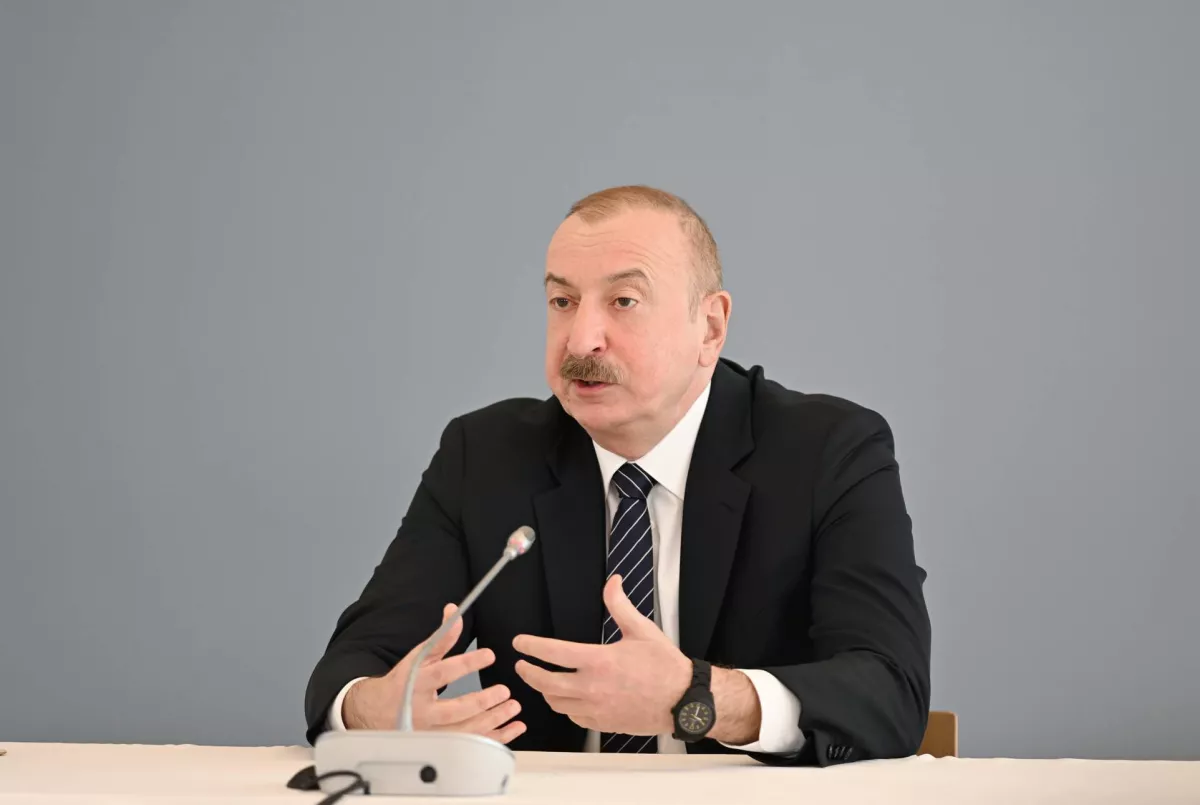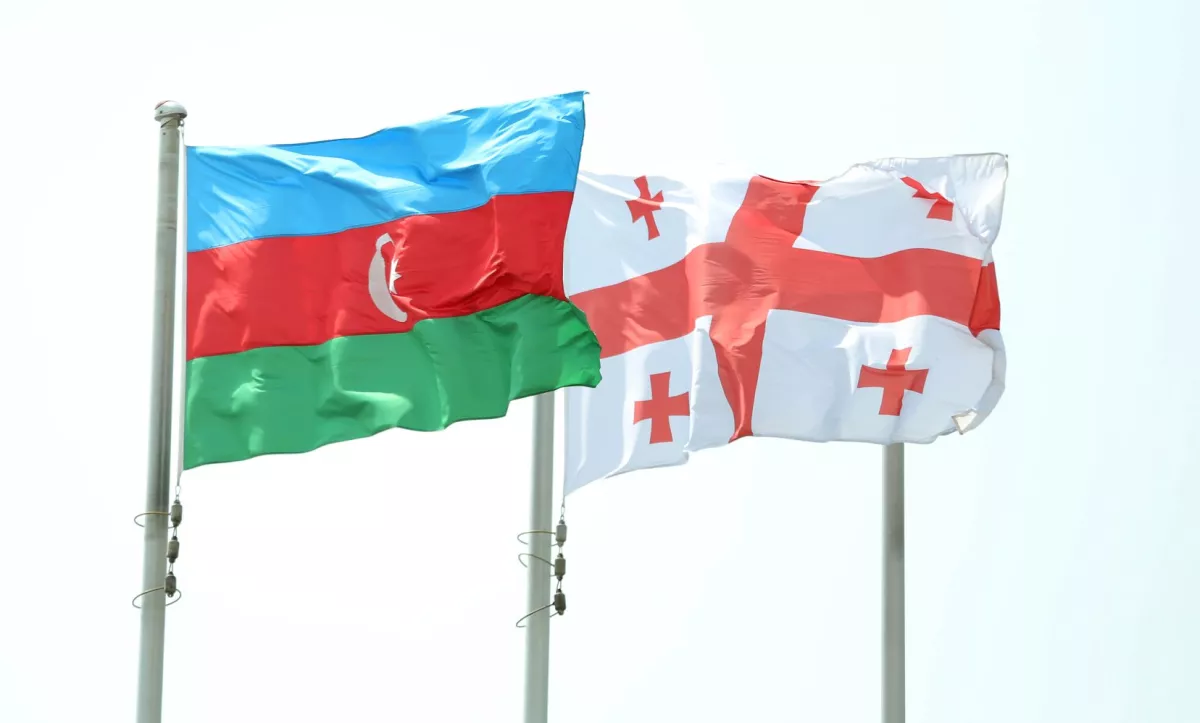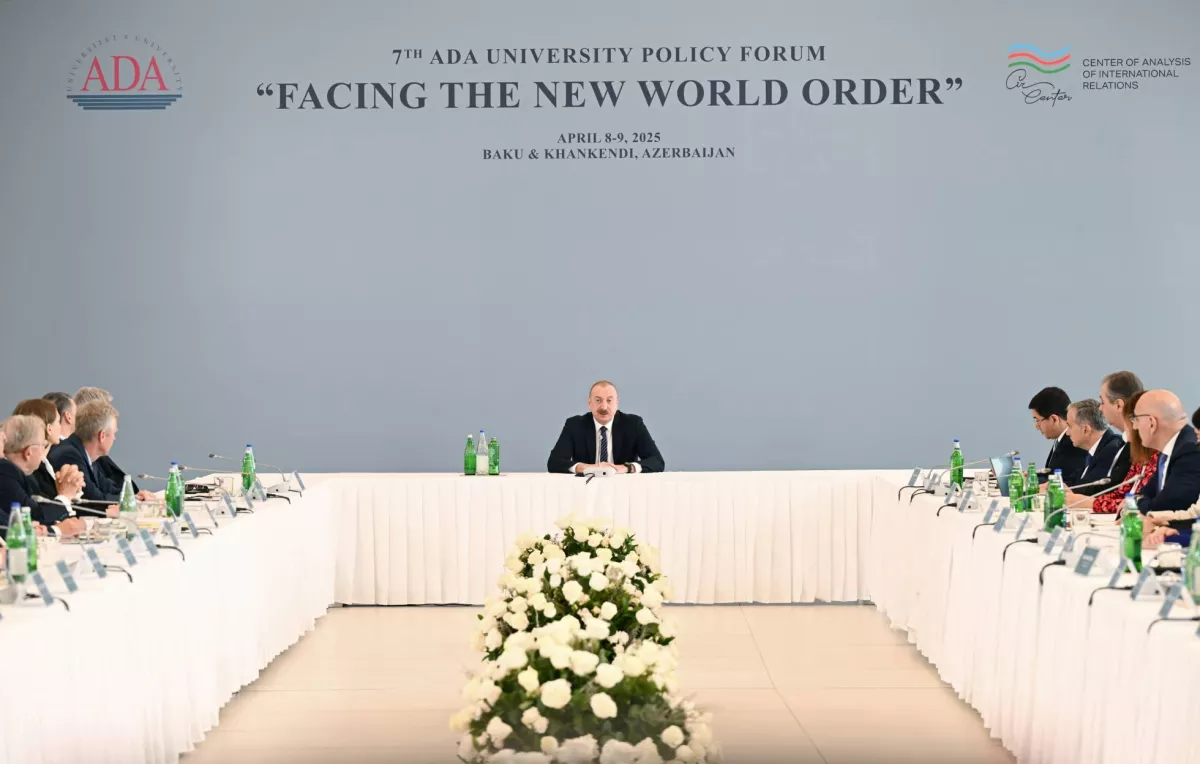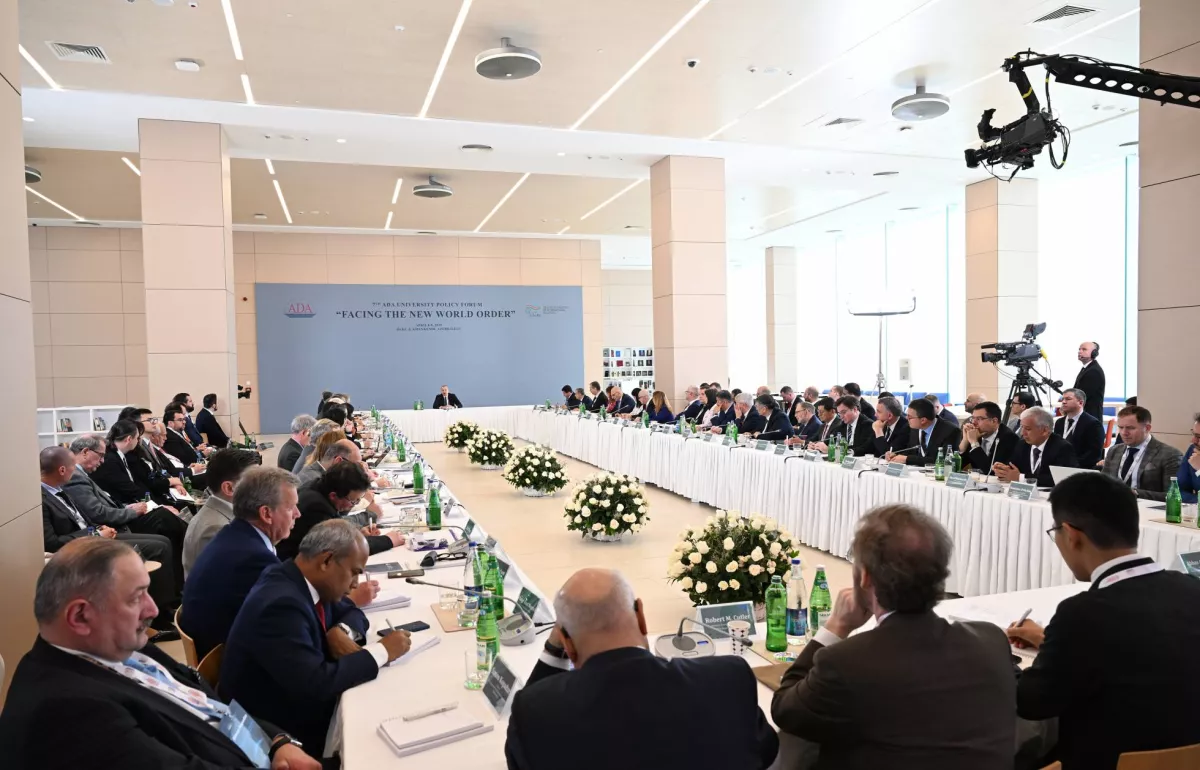Azerbaijan’s Realpolitik: Sovereignty, regionalism, equality Baku’s vision for a strong and integrated South Caucasus
This week, Baku hosted an international forum with a telling title, "Facing the New World Order." Unlike many other countries, Azerbaijan did not nullify the results of the last century in an ideological frenzy but continued to develop based on them. Therefore, today, its leadership speaks about the prospects for the country's, the region's, and the world's development, grounded in new significant achievements. On April 9, President Ilham Aliyev held a conversation with the forum participants.
Pressure on Baku will no longer work
For more than two hours, the country's leader answered questions from the forum participants, but a series of fundamental concepts ran like a thread through Ilham Aliyev's responses. These ideas emerged while discussing various issues and in different contexts, reflecting the unified ideological foundation of the Azerbaijani government's policies.
The most important concept in the country's leader's speech was the emphasis on sovereignty. It can be formulated as the real right of the citizens of the country (and only them) to decide what their state should be like, as well as their (and only their) right to assess the results of the government's work. Azerbaijan defends the principle of respecting sovereignty and seeks to uphold the sovereign rights of others. President Aliyev focused on this issue, speaking about attempts by the European liberal establishment to organize a Maidan in Tbilisi:
"The attitude towards Georgia's internal process in the European Commission is absolutely unacceptable. This is the behavior of colonialists. They try to look at the will of the Georgian people through the principles of a colonial past. This is absolutely unacceptable, and the people of Georgia know that we are with them, and the government of Georgia knows. The internal issues of Georgia must be resolved by the Georgian people, not by bureaucrats from Brussels. So, with respect to all that, we need to strengthen our partnership between Georgia and Azerbaijan."
The President also touched on issues of sovereignty in relation to elections, reminding of attempts by Western structures to interfere in the elections by using the media and comprador opposition back in the early 2000s:
"At the time, we were a little bit naive and could not even imagine that those who smiled in our faces wanted to stab us in the back. We actually did not fully control the financial flows of these funds, and that was the reason why such notorious institutions like the National Democratic Institute (NDI) were actually plotting a coup d’état here. It was detected…So, we experienced all of that. The attempts at an Orange Revolution here in 2005, inspired by the US State Department—we all remember, and we never forget."

Refusal to participate in the work of so-called international structures, which are actually controlled by global powers that deny Azerbaijan equality or attempt to interfere in its internal affairs, is another example of how the concept of sovereignty is being implemented in practice. Aliyev provided several such examples—from the OSCE and PACE to the European Court of Human Rights.
The transnational liberal establishment cannot pressure Baku or limit Azerbaijan's sovereignty because the country's leadership has eliminated the main prerequisites for this. First and foremost, by creating a solid economic foundation for the state. As the president pointed out, "Azerbaijan has, for many years, almost completely reduced its dependence on international financial institutions. We stopped cooperation with the IMF soon after I was elected President for the first time. With other financial institutions, we either completely emptied the portfolio or were very close to that. Our direct foreign debt is something more than 5 billion US dollars only. So it's about less than 7% of our GDP, which is an indicator that we are not in need of financing."
Secondly, pressure is not effective because Azerbaijan has a functioning state, including security forces. During the discussion, the president compared the state of the armed forces in Azerbaijan and Armenia: "The level of discipline in the Azerbaijani Army is well known. We stopped on the outskirts of Khankendi by a single order of the Commander-in-Chief." In contrast, Armenia's weak state, which for years has been seemingly promoting the ideology of militant nationalism, is in practice unable even to carry out military mobilization: "Discipline in the Armenian army is very low. They recruited people who never served, or maybe served 30 years ago in the army — civilians, so-called paramilitary groups, veteran groups, and people who do not serve in the regular army, due to a lack of human resources in Armenia."
Today—a strong state, tomorrow—a peaceful and integrated South Caucasus
The second important concept in Aliyev's discourse was the idea of the South Caucasus region as a vision for a peaceful future. This concept is logically connected to the idea of sovereignty: having strengthened its rights over its land, Azerbaijan, together with all the other peoples of the region, can build a more integrated South Caucasus as the embodiment of their collective will. Interestingly, the president referred to this task as a medium-term goal and repeated in this context that everything is being delayed due to the lack of a peace treaty with Armenia, and there is no need to waste time removing expansionist claims from Armenia's Constitution. The lessons of history are already clear: "Unfortunately, Armenian occupation of Azerbaijan's territory did not allow the South Caucasus to develop as a more or less integrated region. We had all the chances for that."
Shortly thereafter, the president warned against hasty expectations: "We know that there are quite a strong revanchist groups in Armenia. I would divide them in two: active revanchists, those who are responsible for 30 years occupation, and passive revanchists - today's government - which tries to demonstrate a so-called constructive approach, but in fact, lives with the same feelings of revanche and revenge [...] But nevertheless, political establishment of Armenia is not divided on the issue of Azerbaijan. It is consolidated. It's just a matter of vocabulary, matter of behavior and matter of tactics. So, we must be ready for that from military and political point of view."
Nevertheless, while carefully formulating his thoughts on the integration of the South Caucasus, Aliyev emphasized that Armenia is not excluded from this process, and cooperation can begin immediately after the peace treaty is signed. Judging by his words, the country's leadership is already thinking about the possibility of cooperation with Yerevan in practical terms, as after discussing the potential for cautiously building healthier relations between the two countries, the president immediately proposed some ideas on how this can be achieved in various fields, from culture to ecology.
In Baku, the peace treaty is seen as the beginning of the process of intra-regional integration, rather than the end goal. In this regard, Azerbaijan has long sought to reduce potential obstacles to normalizing relations, especially after the already difficult period of aggression against Azerbaijan by Armenian nationalists. Even when discussing military operations, President Aliyev emphasized the importance of minimizing civilian casualties and striving to limit the combat itself, pointing out that in 2020, the Azerbaijani army could easily have crushed the remnants of the separatists. However, according to Aliyev, "We stopped our military operation on the outskirts of Khankendi. We didn't want the war to continue because we didn't want people to die. We wanted to do it peacefully. If we wanted to continue, we were just on the border with Armenia, everywhere in Zangilan in Kalbajar, in other directions, Armenians army were totally demoralized."
Contrary to the propaganda of Armenian revanchists, the Azerbaijani army did not aim for conquests but set out to restore the territorial integrity of its country with minimal human casualties, especially among the civilian population. In 2023, in a certain sense, the situation repeated itself.

However, the new integrated South Caucasus has already taken visible shape even without Armenia, thanks to the growing closeness between Azerbaijan and Georgia. As the president noted, "from the very beginning, Georgia and Azerbaijan demonstrated a very high level of mutual understanding, partnership, friendship, and actually managed to transform the region of the South Caucasus into a strategically important one. It was done by us — only by Georgia and Azerbaijan. Situated between two seas, the Caspian and Black Sea, we are the gateway for each other to connect with different regions and continents."
As we can see, in the context of building a new South Caucasus, there is a particular emphasis on its creation by the peoples of the region themselves, which will make it sustainable regardless of global upheavals. From this perspective comes the principle of rejecting the mediation services of external players in dispute resolution, let alone the refusal to involve external forces in the conflicts of the South Caucasus. According to the president, "we need to look at opportunities in the South Caucasus, to establish ties without any facilitator…We had those facilitators for 28 years — the notorious OSCE Minsk Group, whose only goal was to seal the occupation and transfer Karabakh to Armenia. And now, when we hear about someone who wants to facilitate, we are a little bit concerned. So, let us do it ourselves. We live here in the region. We, as Azerbaijan, want to have good neighborly relations with European institutions, primarily the European Commission, but not at the expense of our interests, not at the expense of their continuous attempts to interfere in our internal affairs, finance different segments of our society, brainwash our young generation, and poison the brains of some people in our region. So, this is how we want to see the South Caucasus."
A strong state—an open country
The third key conceptual framework of Ilham Aliyev's policy appears to be the idea of building a country open to equal cooperation, even with more distant countries. In response to a question from a South African participant at the forum, the head of state pointed out, "during all those years of occupation, our main foreign policy priority was restoration of territorial integrity. All our efforts had the ultimate goal of restoring sovereignty and territorial integrity. That's why many other important issues of our potential foreign policy agenda were overshadowed, and it is understandable, because that was the national idea of Azerbaijani people and Azerbaijani state. Now that this issue has been resolved, we have much more time and many opportunities to build stronger relations with countries we consider friendly."

Baku has no intention of abandoning cooperation with anyone in favor of third countries. The president emphasized the need for interaction with a wide range of parties, particularly the EU, China, Iran, and the Global South. In the current context of disrupted communications across Eurasia due to the conflict between the collective West on one side and Russia and Iran on the other, Azerbaijan's position has significantly changed. The president made it clear that new opportunities come with new risks, stating: "We know that there is a big interest now in Central Asia from the West – whether it's European Union or the United States or other international institutions. And, of course, planning long-term cooperation with that region, it's only enough to look at the map to understand that Azerbaijan cannot be avoided. Though, there are some in Europe, which would prefer to separate Azerbaijan not only from this process but also to build the dividing lines in the Caucasus, particularly in the Southern Caucasus."
He was likely referring to a statement by the EU’s top official Ursula von der Leyen at the Samarkand summit, where she began discussing the opening of Armenia's borders. Aliyev later commented on this incident, responding to a Georgian participant's question: "they only want to open the border between Türkiye and Armenia, open the border between Armenia and Azerbaijan. What does Europe have to do with that? It's none of their business. Relations between Türkiye and Armenia, and Azerbaijan and Armenia — the longer the distance between the European Union and these issues, the better for everyone."
The Azerbaijani state must be strong in the new conditions to resist not only intrigues but also attempts to impose unjust terms on Baku in its relations. Aliyev shared: "Now, the European Union wants more gas from Azerbaijan, and for that reason, the President of the European Commission, Madam Ursula von der Leyen, visited Azerbaijan in July 2022, when the European Union was very concerned about the gas supplies, and we signed the Declaration on Strategic Partnership in the field of energy. Since then, based on the request from the European Commission, we have increased the gas supply to Europe almost at the level of 60%, from 8 BCM in 2021 to almost 13 BCM in 2024." In fact, Baku saved the EU from significant problems. However, even though the EU wants to increase purchases again, it is not investing in the necessary transport infrastructure and is not taking on long-term commitments, thus shifting all the risks onto Azerbaijan.
President Aliyev specifically highlighted multilateral cooperation with several international organizations—from the Non-Aligned Movement (NAM) to the Organization of Turkic States (OTS) and collaboration within the UN on climate change. In particular, Azerbaijan achieved strong positions in the Non-Aligned Movement, with its presidency being unanimously extended for four years, a term that concluded last year—marking a historic first for the organization. Outstanding results were also achieved in international climate cooperation—thanks to Azerbaijan’s leadership role. The country organized the recent COP29 summit, and the funding for global climate programs was tripled to $300 billion, despite pessimistic forecasts that international political confrontation would hinder such progress. Additionally, Aliyev reminded that “another important achievement was an agreement on making carbon market functional. This issue was not agreed for at least 10 years. It was agreed in Azerbaijan, due to our chairmanship, due to trust in us.”

The cooperation within the Organization of Turkic States (OTS) also holds great potential. As suggested by the president's remarks, Baku not only acknowledges the cultural heritage that binds the member countries, but also emphasizes significant material factors that promote collaboration within the OTS framework. In particular, these include crucial continental transit routes connecting Europe to East and South Asia, which are controlled by OTS members, as well as their important natural resources. Given the growing imperialistic ambitions of global players (e.g., the EU and China interested in "West-East" routes, Russia and Iran in "North-South" routes), they are likely to try to intervene in the affairs of OTS member states to protect their interests or disrupt their competitors' ambitions. It is likely in this context that President Aliyev mentioned the military power of OTS countries, particularly Türkiye and Azerbaijan, which can play a key role in protecting the sovereignty of OTS states from such encroachments.
Who can wear the "Crown of Monomakh"?
Some readers, upon reading our summary of the president's statements, might ask: sovereignty, regional cooperation, and openness to the world—what’s so special about this? However, the point is that these imperatives of responsible policy, based on common sense, have increasingly been replaced in recent decades by ideologically driven pseudo-liberal rhetoric, politicized exaltation, and a rush to discard sovereignty and avoid difficult decisions.
Today, we observe many European political leaders, from Ursula to Macron, shaking their fists at Washington but unable to pursue an independent political course without the United States. They have effectively handed over part of their responsibility to transnational political structures, as well as to the U.S., around which these transnational structures have been built. The German philosopher Carl Schmitt once noted that sovereignty belongs only to those who can break free from legalism and declare a state of emergency, initiating decisive actions. Today, it has become abundantly clear that most countries of the collective West, particularly in the EU, are not sovereign.
Unfortunately, another important idea that President Aliyev speaks about has also been lost—the idea of the absolute intrinsic value of the region for the foreign policy of every sovereign country. The proverb that a close neighbor is more important than a distant relative is relevant here. We also see how many countries— from Armenia to Poland— instead of seeking ways of cooperation or even peaceful coexistence with their neighbors in their regions, attempt to ignore and demonize them, relying on external players as protectors, and even betting on the introduction of foreign troops onto their own territory.
In other words, the imperatives of sovereignty, regionalism, and openness to the world as the foundation of Azerbaijan's policy exemplify a responsible approach to the fate of the country and the region. By following this policy, President Aliyev's government has not only restored the territorial integrity of its country but has also brought the region closer to peace, while limiting the interference of external players in regional affairs. In this construction of the new South Caucasus, Georgia has been in solidarity with Azerbaijan in recent years, as its government adheres to similar principles. This is a logical development, as for Baku, it is about inclusive cooperation, not hegemonism.








